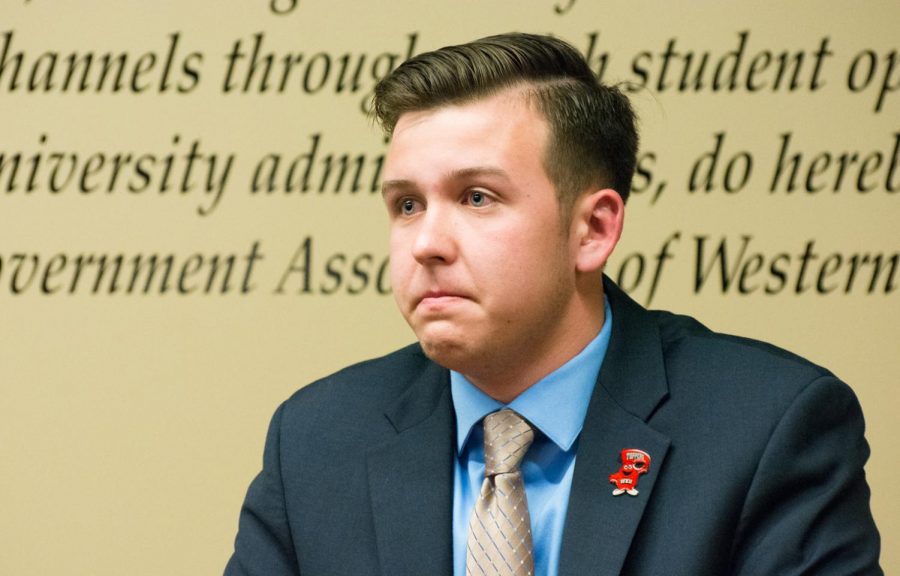Judicial Council votes not to disqualify executive candidates, senate approves new appeal process
April 18, 2018
Students speaking out against the disqualification of a candidate ticket attended the Student Government Association meeting, creating the largest guest attendance during an SGA senate meeting this year.
Stephen Mayer, Garrett Edmonds and Harper Anderson, whose campaign is known as MEA, were running for SGA president, executive vice president and administrative vice president, respectively. Their ticket was disqualified, as was Anna McAvoy who was running for a senator position, following a Judicial Council decision.
The decision was made after a complaint was filed to the Judicial Council regarding a Pepe the Frog meme in one of the ticket’s campaign chalk drawings.
At this meeting, 26 students spoke to the senate on the issue of the disqualification, including 13 members of the senate, executive board and Judicial Council and 12 student speakers, with one student speaker talking twice. Senator Alex Sergent made a motion to allow student speakers to speak at the beginning of the meeting, which passed unanimously by the senate.
Senator Anna McAvoy was the first to speak, and she cried while apologizing for the incident.
“I had no malicious intentions behind it,” McAvoy said, regarding sharing the image of Pepe the Frog. “I apologize profusely.”
Senator Will Harris said he was speaking for “the students’ voices that have been nullified” because of MEA’s disqualification.
“Their voices were silenced because of SGA,” Harris said. “This is not what we stand for.”
Student Spencer Wells said he was elected as an SGA senator under former SGA president Jay Todd Richey and was one of the only Jewish senators in SGA at the time. Wells said his concern was the symbol of Pepe the Frog and what that symbol means.
Wells said he was in Charlottesville, Virginia, during the alt-right riots that took place on Aug. 11, 2017, and he said he saw the Pepe the Frog image being used on white nationalist symbols.
Wells said that although he appreciated McAvoy’s apology, he wanted the apology in the official statement posted by the MEA ticket on its campaign Instagram to be focused on first.
“I understand that you were concerned about having their votes nullified, but this is more than about that,” Wells said. “That image is a symbol of terror for a lot of people.”
Presidential candidate Stephen Mayer spoke to address concerns about what took place and to give a formal apology to the senate.
“I was not part of the chalking team that did the meme themes,” Mayer said. “Before this moment, I had never even seen the Pepe the Frog meme.”
Mayer said he was never contacted about the emergency Judicial Council meeting and did not know his campaign was going to be discussed. Mayer said Chief Justice Annalicia Carlson called him and asked him what his intentions were when drawing the Pepe the Frog image. He said he first asked what Pepe the Frog was and then assumed it was the frog that he heard was one of the chalk meme drawings that had been made.
Mayer said he wanted to give a formal apology.
“Even though I was not directly involved, a member of my ticket was there, and he also did not know about this,” Mayer said, referring to Edmonds. “I wanted to formally apologize for my ticket and apologize for myself and to clear things up.”
Jordan Brown, a member of the chalk drawing team that drew the Pepe the Frog meme, said the image was only a frog meme to the drawing team, not a hate symbol.
“I didn’t know about the white supremacy part of it,” Brown said.
One of the speeches that caused the most uproar from the attending students and guests was from Legislative Research Committee Chair Lilly Nellans, who said she wanted to put the conversation surrounding SGA into context.
Nellans said a lot of the “anti-SGA spirit” began after the reparations resolution passed last April.
“There was a large, I would argue, racist backlash against SGA,” Nellans said. “Since then, the flash points against SGA have been whether or not we should support queer people, whether or not we should support people of color and whether or not we should support immigrants.”
Following that, Nellans clarified her point.
“Meaning that when you have a ticket that is running against the kind of incumbent policies that are supportive of people of color, supportive of queer people, supportive of immigrants, and then that ticket uses a meme that has been used to attack queer people, attack immigrants and attack people of color, it seems incredibly suspicious to believe that that’s not some form of dog-whistling to racists on campus who are tired of white students being underrepresented in SGA,” Nellans said, which caused gasps and whispers among the students attending the meeting.
Student speakers included Cameron Edwards, who said the students were not happy about the decision made to disqualify the candidates.
“Students are not happy about this decision, and right now, they are being oppressed,” Edwards said.
After the student speakers, Chief Justice Annalicia Carlson delivered the Judicial Council’s official statement:
“Last night, the Western Kentucky University Judicial Council met for roughly three hours, debating, contemplating and deliberating upon a respectful and just ruling on multiple cases with our SGA advisor Randall Bogard present for the beginning and the end of the meeting. To begin, we would like to bring acknowledgement to the use of a controversial meme used by the Mayer, Edmonds and Anderson ticket, as well as a McAvoy senate campaign. This act, regardless of intent, is an act that is not acceptable by the ethical guidelines set forth by the Student Government Association Constitution and the election codes.
To clarify, the ticket of Stephen Mayer, Garrett Edmonds and Harper Anderson was found in violation of both 3.4.10.1 of the election codes, as well as the anti-discrimination clause of the Student Government Association Constitution. Consequently, on a vote of 5:4 and 2 against, the ticket has been disqualified from the election entirely. To be clear, Pepe the Frog has been consumed by considerable amounts of racist movements, including white supremacists and hate groups. When acquiring data in contacting these candidates on the April 17th of 2018, one thesis remained true throughout all conversations. Not only was Garrett Edmonds notified by another student that the symbol represented hate speech and thus was aware of the discriminatory actions of his campaign, but his response was to, and we quote, “Blow it off.” While the slogan remained planted on campus sidewalk. Lacking knowledge on this subject cannot be an excuse on these acts, for it is a candidate’s responsibility to understand the content in which they campaign with, as well as the condition of their related candidates.”
[Editor’s note: The Judicial Council meeting that Carlson spoke about was on April 16, not April 17, as noted in the statement.]
“Furthermore, Garrett Edmonds was made aware of the meaning behind the meme, the candidate chose not to remove the imagery. This Council believes that while Stephen Mayer and Harper Anderson were not aware of the symbolism behind the meme, Garrett Edmonds openly expressed his knowledge of the racial undertones to the council. Because Garrett Edmonds was on a ticket with Harper Anderson and Stephen Mayer, the entire ticket will be held responsible for the inappropriate imagery.”
Following the student speakers and the Judicial Council report, the senate passed a bill to include an appeal process for Judicial Council rulings to be revisited and/or voted on again per request by any WKU student.
The appeal would need to fall under at least one of three criteria, including “new facts being presented from the prior ruling, procedural issues are presented from the prior ruling or a petition to hear an appeal signed by no less than ten students.”
To request an appeal of a Judicial Council decision, a student would submit a request online or through a written request submitted to the SGA office within 30 days of the decision, according to the amended bill, which was co-authored by student Francis Wilson, Mayer, presidential candidate Kenan Mujkanovic, Chief of Staff Conner Hounshell, Edmonds and Executive Vice President Savannah Molyneaux.
Because the bill for an appeals process was passed, the Judicial Council voted on whether to uphold or appeal the decision to disqualify the MEA ticket during its weekly meeting, which took place directly after the senate meeting. Those who attended the meeting exceeded capacity and several students who attended stood outside the room because of overcrowding.
After hearing from almost ten student speakers, the Judicial Council voted 3-2 with one abstention to appeal their decision on the MEA ticket. Instead of disqualifying the ticket, the ticket’s campaign would be suspended and an apology by the ticket for using the image would need to be issued.
Speaker of the Senate Asha McWilliams asked the Judicial Council to vote on an appeal for disqualifying McAvoy. After hearing from McWilliams and McAvoy, among others, the Judicial Council voted to appeal the decision to disqualify McAvoy under the same grounds as the ruling for the MEA ticket. In this decision, McAvoy’s campaign was suspended, but she would be allowed to run for senator.
News reporter Nicole Ziege can be reached at 270-745-6011 and [email protected]. Follow Nicole Ziege on Twitter at @NicoleZiege.












![Students cheer for Senator at Large Jaden Marshall after being announced as the Intercultural Student Engagement Center Senator for the 24th Senate on Wednesday, April 17 in the Senate Chamber in DSU. Ive done everything in my power, Ive said it 100 times, to be for the students, Marshall said. So, not only to win, but to hear that reaction for me by the other students is just something that shows people actually care about me [and] really support me.](https://wkuherald.com/wp-content/uploads/2024/04/jadenmarshall-1200x844.jpg)




![Students cheer for Senator at Large Jaden Marshall after being announced as the Intercultural Student Engagement Center Senator for the 24th Senate on Wednesday, April 17 in the Senate Chamber in DSU. Ive done everything in my power, Ive said it 100 times, to be for the students, Marshall said. So, not only to win, but to hear that reaction for me by the other students is just something that shows people actually care about me [and] really support me.](https://wkuherald.com/wp-content/uploads/2024/04/jadenmarshall-600x422.jpg)








